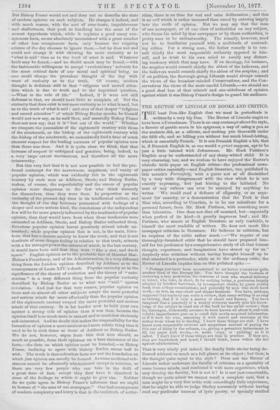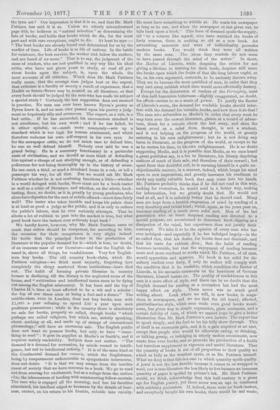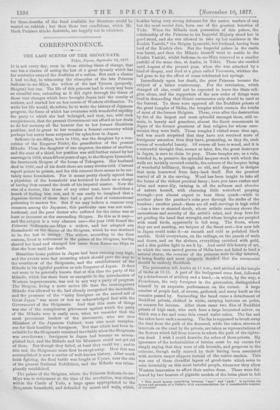T THE RECTOR OF LINCOLN ON BOOKS AND CRITICS. HE least
Don-like English that we meet in periodicals is written by a very big Don. The Rector of Lincoln ought to have been a Frenchman. There is an easy contempt about his style, a flavour of gentle scorn in his epigrams; a way of using a pen as the ancients did, as a stiletto, and smiting you therewith under the fifth rib, and so killing you without too much blood-letting, which is essentially French. It is not Donnish English a bit, that is, if Donnish English is, as one would a priori suppose, apt to be just a little tainted with Johusonese. Mr. Mark Pattison's English may be understanded of any sharp-witted child. It is
very charming, too, and we confess to have enjoyed the Rector's vitriolic little paper on English critics—the professional news-
paper critics especially—and English literature, too, published in this month's Fortnightly, with a gusto not at all diminished
by a very wide disagreement with the view which he is not exactly expressing, but just hinting to the initiated. No man of any culture can ever be annoyed by anything he writes. We could read a defence of oligarchy, or an argu- ment for anarchy, or a demonstration that the Turk is that Man who, according to Comtists, is to be our substitute for a personal future, from Mr. Mark Pattison, with something more than toleration. One does not dine off mustard, but—especially when perfect of its kind—it greatly improves beef ; and Mr. Pattison, who sneers at English literature as only readable, is himself the most readable of writers. He does not much like newspaper criticism in literature. Ile believes in criticism, but he requires of the critic rather much ;—" We require of our thoroughly-furnished critic that he should have prepared him- self for his profession by a comprehensive study of all that human
thought, experience, and imagination have stored up for us." Anybody who criticises without having brought himself up to that standard is a pretender, while as to the ordinary critic, the Rector of Lincoln impales him on this polished spike :— " Perhaps you have been accuetomed to sot before yourselves vite another ideal of the literary life. You have thought the business of reviewing a lazy profession, the resource of men who wanted industry or talent, who wore, in short, fit for nothing better, a profession largely adopted by briefiess barristers, by incompetent clerks, by green youths fresh from college examinations, and generally by men who shirk hard work,—in fact, an easy-chair and slipper business. You have, perhaps, supposed that anybody can write a review, that essay-writing is as easy as talking, that it is only a matter of cheek and fluency. You have imagined that a quarterly or a weekly reviewer merely gets his know- ledge of the subject in hand out of the book he has under review; that lie, thereupon, dishonestly assumes to have known all about it, and with voluble impertinence goes on to retail this newly-acquired information as if it were his own, seasoning it with sneers and sarcasms at the author from whom he is stealing. I know these things are said. I have heard even respectable reviews and magazines accused of paying for this sort of thing by the column, i.e., giving a pecuniary inducement to fill out paper with words,—to make ' copy,' or padding,' as it is called. I don't know if these things are done in practice. If they are, they are fraudulent, and must, I should think, come within the Act against adulteration."
That is very nicely put indeed, the deadly little stroke being de- livered without so much as a full glance at its object ; but then, is the thought quite equal to the style ? Does not the Rector of Lincoln rather underrate the faculty of criticism as a speciality of some human minds, and confound it with mere experience, which may develop the faculty, but is not it ? Is it not just conceivable, though we quite admit we cannot recall a complete case, that a man might be a very fine critic with exceedingly little experience, that he might be able to judge Shelley accurately without having read any particular amount of lyric poetry, or specially studied the lyric art ? Our impression is that it is so, and that Mr. Mark Pattison has said it is so. Unless we utterly misunderstand page 669, he believes in " natural selection" as determining the fate of books, and holds that books which do die, for the most part and with rare exceptions, ought to die. At least he says :— " The best books are already found and determined for us by the verdict of time. Life of books is as life of nations. In the battle for existence, the best survive, the weaker sink below the surface, and are heard of no more." That is to say, the judgment of the mass of readers, who are not qualified in any way like his ideal critic, who have not given years to study, or read all pre- vious books upon the subject, is, upon the whole, the most accurate of all criticism, Which does Mr. Mark Pattison really mean, that the average man judges best or the expert, that criticism is a faculty or merely a result of experience, that a Hazlitt or Sainte-Beuve may be trusted on all literature, or that every book should be judged by the man who has made its subject a special study ? Certainly the last suggestion does not succeed in practice. No man can ever have known Byron's poetry as Byron knew it, and no man ever passed upon his poetry a judg- ment so hopelessly silly and erroneous. The expert, as a rule, is a bad critic. If he has succeeded, his unconscious standard is not excellence, but his own work ; and if he has failed, he is either spiteful, or—much more commonly—sets up a standard which is too high for human attainment, and which therefore redeems his own self-respect in his own eyes. As for the newspaper critic, we do not much care to defend him, he can so well defend himself. Nobody ever said ho was a grand being. He is a necessary functionary in a particular state of civilisation, and we should as soon think of defending him against a charge of not studying enough, as of defending a policeman for not being thoroughly up in the history of crime. He can catch a thief, or send a drunkard home in a cab, or tell a passenger his way, for all that. But we would ask Mr. Mark Pattison whether he is not confusing functions a little—whether in a world deluged with books, there must not be a book-taster as well as a critic of literature, and whether, on the whole, book- tasting, done, no doubt, as it is, greatly by young graduates, who alone have digestion for the sort of article offered—is not done fairly well? The taster who takes trouble and keeps his palate clean is at least as good a judge as the public, and it is only to reduce the public's labour, that he ever seriously attempts. That he allows a lot of rubbish to pass into the market is true, but what good book have the tasters ever seriously kept back ?
Wo hardly know, however, why Mr. Mark Pattison cares so much that critics should be competent, for according to him, the occasion for their competence is very slight indeed. He holds that the principal factor in the production of literature is the popular demand for it—which is true, no doubt, of an immense mass of our literature—and that the English de- mand is, above all things, for readableness, Very few English- men buy books. The old country book-clubs, which Mr. Pattison eulogises—we think most unjustly, forgetting how completely the clergy mastered those institutions—have died out. The habit of forming private libraries in country houses is declining, till the library is the neglected room of the house, and " cultivation and intellectual tastes seem to be dying out among the English aristocracy. It has been said the fop of Charles IL's time at least affected to be a wit and a scholar ; the fop of our times aims at being a fool and a dunce." The middle-class, even in London, does not buy books, men with £1,000 a year refusing to spend £50 a year upon such profitless possessions ; while in the country there is absolutely no sale for books, properly so called, though books " which perhaps are called religious, but which are, strictly speaking, about nothing at all, and made up of strings of conventional phraseology," still have an enormous sale. The English public does not want to possess books, but only to have " some- thing to read " ; it gets its supplies at Mudie's or Smith's, and it requires mainly readability. Subject does not matter. " The demand is a demand for recreation, by minds roused to intelli- gence, but not to intellectual activity." It is of the same kind as the Continental demand for causerie, which the Englishman, being by temperament unfavourable to sympathetic intercourse, does not desire. "It is that we may escape from the terrible ennui of society that we have recourse to a book. We go to read not from craving for excitement, but as a refuge from the txdiunt vitas, the irksomeness of herding with uninteresting fellow-mortals. The man who is engaged all the morning, and has his faculties stimulated, his intellect edged to keenness by the details of busi- ness, cannot, on his return to his fireside, subside into vacuity.
He must have something to whittle at. He reads his newspaper as long as he can, and when the newspaper at last gives out, he falls back upon a book." This form of demand spoils the supply, till "to a veteran like myself, who have watched the books of forty seasons, there is nothing so old as a new book. An astonishing sameness and want of individuality pervades modern books. You would think they were all written by the same man. The ideas they contain do not seem to have passed through the mind of the writer." In short, the Rector of Lincoln, while despising the critics for not giving a lifetime to training for their trade, despises still more the books upon which the fruits of that life-long labour ought, as he, on his own argument, contends, to be uselessly thrown away. They are to become the most qualified of men, in order that they may cart away rubbish which time would more effectually destroy.
Except for the delectation of readers of the Fortnightly, most of this half-humorous bitterness—slightly exaggerated, no doubt, for effect—seems to us a waste of power. To justify the Rector of Lincoln's scorn, the demand for readable books should inter- fere with the demand for valuable books, and how does it do that? The man who subscribes to Mudie's in order that every week he may turn over the newest literature, glance at a record of adven- ture, think for a minute about the last essay, and skim the latest novel as a relief from thought, is not a student, and is not helping on the progress of the world, or greatly assisting in his own enlightenment ; but he is not doing any harm to literature, or the progress of the world, or except so far as he wastes his time, to his own enlightenment. He is no doubt supporting Mudie, and it is possible that Mudie, as we once heard a great publisher say, is a foe to literature, his library depriving authors of much of their sale, and therefore of their reward ; but apart from that doubtful evil, he is amusing himself in a quite un- objectionable manner, in a manner, indeed, which keeps his mind open to new impressions, and greatly increases his readiness to study any really valuable book that may come into his hands. Mr. Pattison probably thinks that if he did not read in this way, seeking for recreation, he would read in a better way, seeking for information, but we greatly doubt that. He would not read at all, and it is infinitely better that he should read. Many , men are kept from a brutish stagnation of mind by reading of a very desultory and trivial kind ; which, again, as the years pass on, becomes reading of a much more solid sort. Men of the last generation who at heart despised reading not directed to a special purpose, are accustomed to denounce book-dipping as .a dissipation of the miud, but experience does not justify their contempt. We take it to be the opinion of every man who has ever indulged—and especially if he has indulged largely—in the so-called vice, that his desire for books does not diminish, and that his taste for rubbish does ; that the habit of reading becomes incurable, but that the enjoyment of reading becomes more and more confined to works which Mr. Pattison, of all men, would appreciate and approve. No book is too solid for de- sultory readers over forty, if only its author will comply with the condition that it be readable, which condition.the Rector of Lincoln, in his sarcastic comments on the heaviness of German literature, himself insists on. The quality of readableness in this case is a mere effect of style, and there can be no doubt that the English demand for reading as a recreation has had the most happy effect on style. There never was so Dinah good writing about. Look ,where we will, in new books, in maga- zines, in newspapers, and we see that the old heavy, affected, platitudinarian style, which once made even good books weari- some, has given way to simple expression, plain sentences, and a certain felicity of turn, of which we cannot hope to give a better illustration than Mr. Mark Pattison's own lecture. The expert has to speak simply, and the fool to let his folly show through. This of itself is an enormous gain, and it is a gain acquired at no cost, except that people who would be otherwise eating, or drinking, or talking gossip, or indulging in utterly useless amusement, now waste time over books, and so provoke the production of a feeble but harmless supplement to vigorous and maul literature, That the quantity of books is out of all proportion to their quality we admit as fully as the weariest cynic, or as Mr. Pattison, himself. What we deny is that this is a case in which quantity spoils quality. A jewel is not the less durable because it comes to us wrapped in wool, nor is true literature the less likely to live because an immense quantity of paper is spoiled by printer's ink. Mr. Mark Pattison would, we think, acknowledge that this half-century is a great age for English poetry, yet there never was an age so cumbered with, rubbishy poetasters. If, indeed, there were no book-tasters, and everybody bought his own books, there would be sad waste,
for three-fourths of the fund available for literature would be wasted on rubbish ; but then these two conditions, which Mr. Mark Pattison thinks desirable, are happily not in existence.








































 Previous page
Previous page